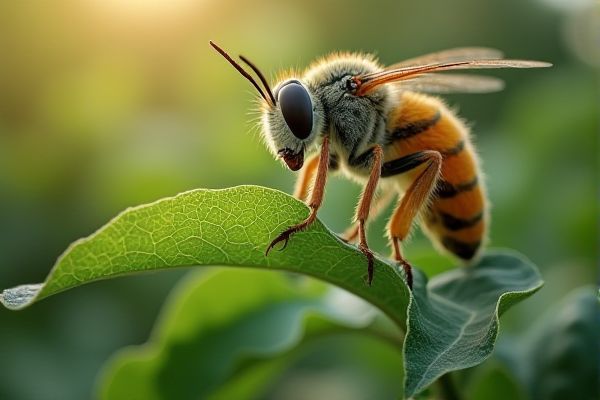
Kenya offers a range of job opportunities in the field of botany, driven by its rich biodiversity and strong agricultural sector. Positions can be found in research institutions, universities, and non-governmental organizations focusing on conservation, environmental sustainability, and agricultural development. Opportunities also exist in governmental agencies dedicated to natural resources management and environmental policy. Graduates with expertise in plant sciences, forestry, and horticulture are particularly sought after, reflecting the growing need for sustainable practices in both urban and rural settings.
Job Description
Botany jobs in Kenya encompass a variety of roles focused on the study and conservation of plants and ecosystems. Positions may involve research, fieldwork, and educational outreach, allowing you to contribute to biodiversity conservation and sustainable practices in Kenya's unique landscapes. Employers include government agencies, non-profit organizations, and academic institutions dedicated to environmental science. Ideal candidates often possess a degree in botany, ecology, or environmental science, along with strong analytical and communication skills to effectively share knowledge and findings.
Requirement
Botany jobs in Kenya often require a background in plant science or environmental biology, with a bachelor's degree being the minimum qualification. Experience in research or fieldwork is highly desirable, showcasing your practical understanding of plant ecology and conservation practices. Proficiency in data analysis and familiarity with software tools related to botany can enhance your job prospects significantly. Networking with professionals in the field and obtaining relevant certifications can also provide a competitive edge in the Kenyan job market.
Salary and Perks Expected
Botany jobs in Kenya offer a diverse range of opportunities in conservation, research, and environmental management. Salaries for these positions typically range from KSh 40,000 to KSh 150,000 per month, depending on experience and the specific role. Perks may include fieldwork allowances, health insurance, and opportunities for professional development. Engaging in botany not only contributes to environmental sustainability but also allows you to explore Kenya's rich biodiversity.
Similar Job Names
- Botany Research Scientist
- Conservation Biologist
- Plant Ecologist
- Taxonomist
- Horticulturist
- Plant Physiologist
- Agroecologist
- Environmental Consultant
- Flora Inventory Specialist
- Ethnobotanist
- Seed Bank Manager
- Plant Breeder
- Forest Ecologist
- Agricultural Scientist
- Restoration Ecologist
- Soil Scientist
- Herbarium Curator
- Wildlife Biologist
- Plant Pathologist
- Field Botanist
Job Expectation Concept
In Kenya, botany jobs often require a strong understanding of plant biology, ecology, and environmental science. Positions can vary from research roles in universities and governmental agencies to practical applications in agriculture and conservation organizations. Job seekers can explore opportunities in fieldwork, laboratory analysis, and biodiversity conservation, contributing to sustainable practices and environmental protection. Networking within local academic institutions and environmental groups can enhance your chances of securing a position in this vital field.
Career Advantage and Weakness
Botany jobs in Kenya offer the advantage of contributing to the preservation of the rich biodiversity found in the country, which is home to unique ecosystems and numerous endemic species. Such careers often allow you to engage in crucial research and conservation efforts, making a significant impact on environmental sustainability. However, the field may present challenges, including limited funding for research initiatives and potential job competition, particularly in academic and government sectors. Professionals may also face the difficulty of navigating bureaucratic processes related to environmental policies and land management.
Important Thing Must Know
Botany jobs in Kenya offer exciting opportunities in biodiversity conservation, agriculture, and environmental research. Many roles require a strong educational background in plant sciences, which might include degrees in botany, horticulture, or related fields. Fieldwork is a significant aspect of these jobs, allowing you to explore Kenya's diverse ecosystems, from rainforests to savannas. Employers, including government agencies and NGOs, often look for skills in research methodologies, data analysis, and community engagement. Networking and internships can provide a competitive edge in this growing sector, helping you connect with professionals in the field and gain practical experience.
Alternative Career Options
Kenya offers various alternative career options for individuals with a background in botany. Conservation organizations seek professionals to manage and protect biodiversity in national parks and reserves, ensuring the sustainability of ecosystems. You can explore opportunities in agriculture, working with innovative farming practices aimed at increasing crop yields and promoting sustainable land use. Additionally, research institutions value botanists for ecological studies, helping to advance knowledge in climate change and food security.
Companies List
- Kenya Forestry Research Institute (KEFRI)
- Kenya Agricultural and Livestock Research Organization (KALRO)
- National Museums of Kenya
- Kenya Plant Health Inspectorate Service (KEPHIS)
- University of Nairobi, Department of Botany
- Kenya Wildlife Service (KWS)
- East African Wildlife Society
- Botanic Gardens Conservation International (BGCI)
- International Centre of Insect Physiology and Ecology (icipe)
- EcoAgriculture Partners
List of Ideal City
Nairobi is a prominent hub for botany jobs in Kenya, hosting numerous research institutions and universities dedicated to plant science. Kisumu, with its proximity to diverse ecosystems, offers opportunities in conservation and environmental management. Eldoret, known for its agricultural activities, provides a platform for agricultural research and development in botany. Nakuru, surrounded by national parks, presents avenues for ecotourism and biodiversity studies, making it an attractive location for professionals in the field.
 jobs-kenya.com
jobs-kenya.com